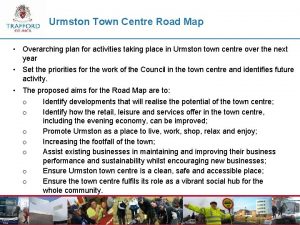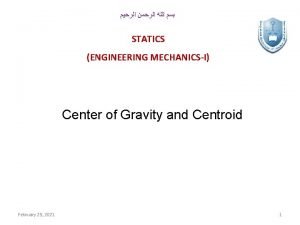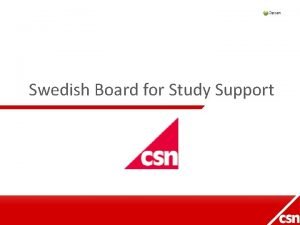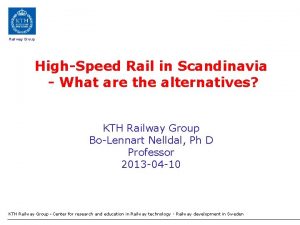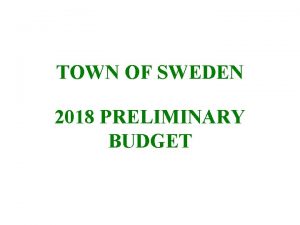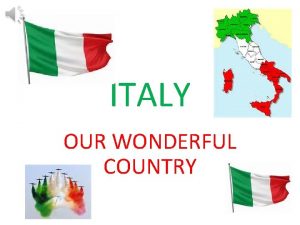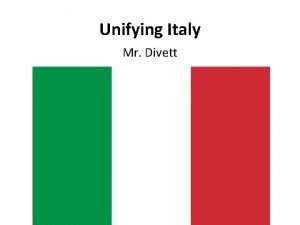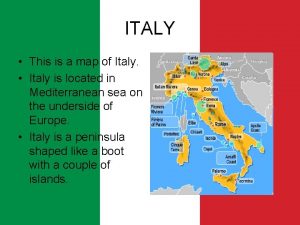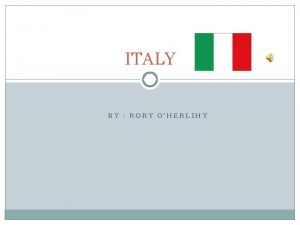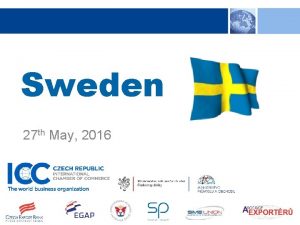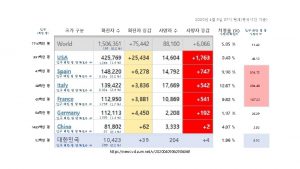Town Centre Management Evidence from Italy and Sweden























- Slides: 23

Town Centre Management Evidence from Italy and Sweden Federica Caboni Department of Economic and Business Science University of Cagliari, Italy

Italian Context In 1998 the Government passed a national law called the “Bersani Decree” to enable Italy to respond to: • Modernise the economy by encouraging several kinds of retailing • Regulate the growth of artificial shopping centres outside the Town Centre • Support traditional retailers within the Town Centre

The “Bersani Decree” Increase competition in the Italian retail sector through: • Abolition of a set of regulations • Introduction of a classification of retail activities • Protection of existing network of smaller town centre retailers • Cancellation the limit on the number of stores per City • Liberalization of shop opening hours

After Bersani Decree Several Italian Regions issued Regional Laws on “Centri Commerciali Naturali” (CCN)1 • In order to preserve the traditional retail within Town Centre 1 Natural Shopping Centre

Italian CCN’s Regional laws

Natural Shopping Centres “Formal partnership of local independent businesses that work together on coordinated and proactive initiatives, to enhance the value of the Town Centre”

Why was the Natural Shopping Centre created? To revitalize the Town Centre and its retail activities To regenerate traditional shopping areas and attract people

Italian Strategies Nowadays not every Region has a guide that certifies the number of CCN’s per Region Therefore the main representative associations of Trade companies and the Chamber of commerce work together in order to improve the number of CCN’s Supported by Regional Funding and European Regional Development Fund (ERDF)

Italian Experience Retailer-led approach Public-led approach

Retailer-led Approach Is created by initiative of the traders category organizations There is a voluntary annual contribution to become a member and / or contributions for ad hoc projects The main activities are related to promotional activities, loyalty, customer services The public sector contributes with a partial financial contribution, but not entering in the initiative Often there is a coordination with cultural and tourist organizations

“Cesena. In. Centro” The “Cesena. In. Centro” TCM scheme was created in 2003 Aims to revitalize the Cesena’s town centre with a strategic actions by involving cultural, entertainment, tourist and public institutions The promotion of retail activities is one of the main drivers directed to reclaim the importance of the town centre’s retail and tourist businesses

Main Activities To overcome the parking problems Free shuttle available all night with bus stops located opposite Cesena’s main evening attractions Events organised in cooperation with cultural institutions and associations Cultural, social and musical events are increased through free tickets for customers of retailers of the TCM Child entertainment; prize competitions for customers; customers services for home delivery’s purchases

Public-led Approach Developed through a Regional law Municipalities get funding for projects aimed at urban revitalization Funding have a limited time horizon and intended solely to specific proposals approved The local authority achieves only structural interventions

“Piedmont Project” In this region were created through specific law, organisms mainly composed of small retailers, whose main activity was the promotion, marketing and service management for the benefit of its members and consumers The projects are promoted by municipalities in order to preserve, develop and strengthen the trade by strengthening of the image of urban identity and urban regeneration (D. C. R. No. 563 -13414 of 29/10/99 art. 18)

Main Activities Spaces for service management Customer loyalty initiatives Entertainment services and child care Services of after-sales Loyalty cards Promotional initiatives Information point

Swedish Context 1980: first TCM’s scheme 1993: birth of Fo reningen Fo rnya Svenska Stadska rnor (Association of TCM) About 100 Town Centre have Town Centre Management – all on voluntary basis Nearly all public/private partnerships Nowadays 1/3 of Swedish Cities have a TCM’s organization

Swedish TCM’s Aim Raise money locally to spend locally on: • Public space and security • Marketing, promotion and events • Economic development • Parking and transportation • Capital improvements

To overcome the retail decentralization Retailers Property owners Local government Work together in a cooperative way

Swedish Strategies Strong partnership, in which the participation and financing are almost equally distributed between the three key actors: local government, retailers and property owners It is a totally voluntary partnership, which may take various forms of organization There is no a specific legislative provision

Västerås: the City without Limit Located in the middle of Sweden, approximately 100 km from Stockholm 136. 000 inhabitants The Town Centre is closed in a specific space characterized by a total retail surface area of 110. 000 squared meters The creation of Town Centre Management (TCM) scheme began in 1995 1997 saw the creation the Västerås Citysamverkan

Västerås Citysamverkan Was founded as a not-for-profit limited company owned by its members Each member contributes by paying a membership fee proportional to their retail/business surface; he/she is directly involved in the creation of a strategic plan of urban planning, street and house lighting, management of public spaces Local planning and policy documents from the early 2000 s emphasize the importance of trade and shopping for the further development the Town Centre

Västerås Vision Through many years of creative thinking it has found a unique way to combine out-of-town shopping with a dynamic inner city wove together the history and the future in order to have a city where people feel that everything is possible a city in which human beings and technology combine in a thriving symbiosis

THANK YOU FOR YOUR ATTENTION Federica Caboni federica. caboni@unica. it Department of Economic and Business Science University of Cagliari, Italy
 Town b is 380 km due south of town a
Town b is 380 km due south of town a Urmston town centre
Urmston town centre Cleethorpes town centre
Cleethorpes town centre Center of gravity statics
Center of gravity statics Centroid of wire
Centroid of wire Explain how class evidence may be useful.
Explain how class evidence may be useful. Secondary sources
Secondary sources Primary evidence vs secondary evidence
Primary evidence vs secondary evidence Primary evidence vs secondary evidence
Primary evidence vs secondary evidence Primary evidence vs secondary evidence
Primary evidence vs secondary evidence Jobs vancouver
Jobs vancouver Why is fiber considered class evidence
Why is fiber considered class evidence Class vs individual evidence
Class vs individual evidence Class vs individual evidence
Class vs individual evidence The absence of evidence is not evidence of absence meaning
The absence of evidence is not evidence of absence meaning Sweden and norway use equal quantities of resources
Sweden and norway use equal quantities of resources Solar system sweden
Solar system sweden Swedish csn
Swedish csn Railway network sweden
Railway network sweden He specialized in military gymnastics.
He specialized in military gymnastics. The physical geography of northern europe
The physical geography of northern europe Eures sweden
Eures sweden Studying in sweden as an eu citizen
Studying in sweden as an eu citizen Sollentuna prison sweden
Sollentuna prison sweden

